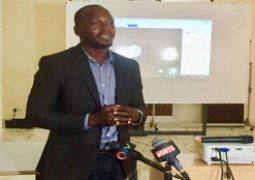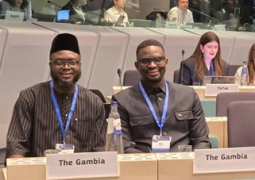Professor Salma Abbasi, chairperson and Founder of eWorldwide Group, in her inaugural lecture, expressed gratitude to UTG’s leadership for their commitment, and commended the vision driving the new lecture series. She dedicated her message to the youths, particularly the young women who made up more than half of the participants. “You inspire me to stand here today,” she said, calling herself “a sister, an aunt, a mother, and even a grandmother” to the next generation she hopes will lead Africa’s transformation.
Professor Abbasi described Africa as standing at a pivotal moment in its agricultural and food systems trajectory, with unprecedented opportunities to build climate-resilient, technology-driven economies. She invited attendees to imagine a future where subsistence farmers, cooperatives, ministries, universities, and industries are connected through real-time data, artificial intelligence, IoT sensors, and satellite systems all working together to strengthen productivity, sustainability, and food security.
She stressed that such a future is not distant or idealistic, but attainable through coordination, cooperation, and the adoption of proven technologies already piloted across the continent.
Highlighting current challenges, Abbasi delved into land degradation, climate shocks, weak infrastructure, low technology adoption, fragmented value chains, and limited visibility in data. She argued that African societies must confront these realities with honesty and urgency. “These are not distant threats, they are here now,” she warned, calling for holistic, multi-sectoral approaches that integrate digital solutions with policy reform, institutional strengthening, and community engagement.
Professor Abbasi also outlined 10 transformative technologies shaping modern agriculture, which includes AI-powered pest detection, smart irrigation systems, predictive climate analytics, drone-enabled mapping, satellite-driven soil health monitoring, precision livestock farming, blockchain traceability, digital advisory platforms, and biotechnology for climate-resilient crops. She emphasised that these innovations can significantly boost yields, enhance sustainability, and generate economic opportunities for Gambian youth, women, and rural communities, if supported by the right infrastructure, skills, and policy frameworks.
She urged universities, government agencies, industry players, and development partners to collaborate more intentionally, stressing that research must be co-created and solutions tailored to local needs. She encouraged students to pursue innovative ventures, reminding them that successful entrepreneurship begins with passion and purpose. “What you care about is where you will succeed,” she said.





